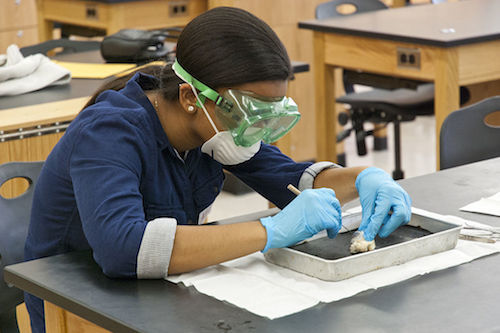Discovery Institute's Blog, page 29
October 29, 2016
Comparing Drones and Swifts, Swifts Win, Hands Down
Swedish researchers have found that common swifts can stay aloft for close to an incredible ten months, straight, no rest-stop breaks, perhaps sleeping while in flight. A Wall Street Journal article summarizing a paper in Current Biology makes the interesting comparison of human technology, specifically lightweight drones, to these little birds.
Micro air vehicles, or MAVs, can remain in the air for a matter of mere hours. "Their performance is ridiculous compared with these birds," Lund Uni...
October 28, 2016
Burj Khalifa -- A Big Example of Biomimetics
Biomimetics is the science, and art, of taking inspiration from nature to solve engineering challenges in human technology. Here's a big illustration -- very big, in fact at 2,722 feet the tallest building in the world, Dubai's Burj Khalifa.
A neat video from Real Engineering observes that the move to taller and taller skyscrapers is likely to continue as relevant engineering problems are solved. In the case of the Burj Khalifa, they took inspiration for the trifold footprint of the structu...
Fact-Check: Louisiana's Science Education Act Does NOT Authorize Teaching Creationism

In an article at Vox, a website the offers to "explain the news" for readers, Sean Illing shares an interview with science educator Amanda Glaze. Unfortunately, in "Teaching evolution in the South: an educator on the 'war for science literacy,'" he repeats the mistake of many media sources, mischaracterizing an academic freedom law as authorizing instructors to teach creationism.
I lived and taught in Louisiana until recently, and there you had a well-educated Republican governor [Bobby Jind...
On the Origin of Brains
Brains first make their appearance in the Cambrian explosion. Beware, your own brain may explode when you hear how Darwin defenders explain their origin.
Consider for a moment how complex even a simple brain is. A single neuron is very complex, lined with precision sodium channels that "fire" in sequence down an axon or dendrite. At the tip, vesicles carry complex chemical neurotransmitters across a gap, or synapse. But a single neuron is useless alone; it needs a network of other neurons to...
October 27, 2016
Artificial Eggs Used to Make Living Animals

As we roll around in the dirt like Sarge fighting Beetle Bailey, big and potentially culture-altering events are occurring in the world that are not being discussed, much less debated.
Scientists have turned rodent skin cells into eggs, which were fertilized and the resulting embryos brought to birth. From the Telegraph story:
Artificial eggs have been grown in a petri dish for the first time and used to create living animals in a breakthrough hailed as 'remarkable' by British experts.
Scien...
You've Come a Long Way, Behe

When Michael Behe published Darwin's Black Box twenty years ago, Darwinists replied that the book's star icon of ID, the bacterial flagellar motor with its irreducibly complex design, would soon be explained along Darwinian lines as the product of unguided evolutionary processes. Give us a decade, they assured the public, two at max. We'll have it all figured out by then.
Robert Crowther talked with Dr. Behe ten years ago in an ID the Future episode about efforts to debunk the flagellum as...
New Research Finds Two Trillion Galaxies

New research demonstrates that the previous estimate for the number of galaxies was too low -- by a factor of 10.
In fact, there are two trillion galaxies in the observable universe. That's 200 galaxies per person on earth, notes Forbes. Impressive -- but there's more.
How did scientists come up with this new, astronomical number? Scientists determine distance of galaxies by calculating red shift. Distance is measured by the time it takes for light to reach an observer -- on the cosmologic...
Philosophical Objections to Intelligent Design: A Response to Critics
Editor's note: In celebration of the 20th anniversary of biochemist Michael Behe's pathbreaking book Darwin's Black Box and the release of the new documentary Revolutionary: Michael Behe and the Mystery of Molecular Machines, we are highlighting some of Behe's "greatest hits." The following was published by Discovery Institute on July 31, 2000. Remember to get your copy of Revolutionary now! See the trailer here.
I. Is Intelligent Design Falsifiable?
Some reviewers of Darwin's Black Box (Beh...
October 26, 2016
An Open Letter to Dr. Hossenfelder's Mother

Writing at Forbes, theoretical physicist Sabine Hossenfelder neatly dismisses media hype about a "multiverse" ("Sorry, 'Flash' Fans -- There's No Evidence For A Multiverse Yet"). Her own mom, she explains, was perplexed by media headlines about the "multiverse" and asked her about it -- "I read the [Large Hadron Collider] people have shown we live in a multiverse!"
You can read the windup for yourself. Dr. Hossenfelder concludes:
In a nutshell, the argument is that since theoretical physici...
Darwinism and "Astroturf"
Here's a helpful concept from investigative journalist Sharyl Attkisson. In an excellent TED talk, she calls it "astroturf" -- a false impression of grassroots or otherwise widespread support for an idea, cause, or product. The technique is rampant and of course the Internet is peerless in manipulating an impression of consensus to steamroll public opinion and shut down skepticism.
Attkisson identifies some "hallmarks" of astroturf and they all ring bells. First is
"inflammatory language" -...
Discovery Institute's Blog
- Discovery Institute's profile
- 15 followers





